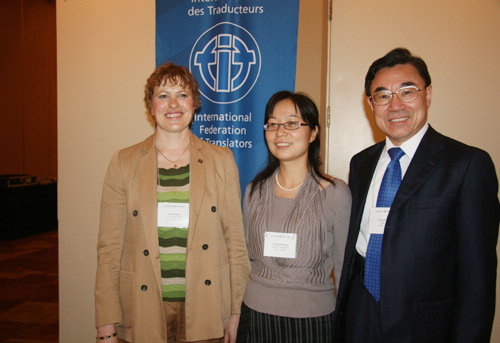|
 |
|
SENIOR TRANSLATORS: (Left to right) FIT President Marion Boers, newly elected FIT Council member Huang Changqi and former FIT Vice President Huang Youyi pose for a picture after the election of new FIT leadership on August 1 in San Francisco (WANG QIAN) |
It is no surprise Jost Zetzsche, an English-to-German translator, raised the question of whether machine translation would ever replace the human variety in front of 700 interpreters and translators who gathered in San Francisco to discuss topical issues in the translation industry.
Lately, new technology in machine translation—software applications used to translate from one language to another—have been developed and used for translation work. It takes only a second to turn a whole piece of text into a different language, disregarding the quality of translation. People wonder: Will these technologies in the near future replace humans for translation?
Zetzsche's answer was "No." Machines and technology to him are tools. Tools will not replace translators, "but translators with tools will," he said, giving a keynote speech at the 19th World Congress of the International Federation of Translators (FIT), a major event in the global translation community, held in San Francisco from August 1-4.
"The theme of this congress—Bridging Cultures—reflects the very essence of what we as translators and interpreters do," said Marion Boers, President of FIT, an international NGO comprising more than 100 professional associations representing some 80,000 translators, interpreters and terminologists in over 60 countries.
Zetzsche's opinion was echoed by other participants in the triennial forum. Huang Changqi, Assistant to the President of the Translators Association of China (TAC), told Beijing Review translation requires not just linguistic knowledge, but also other skills, such as expertise on a particular subject and mastery of new information technology.
The human being plays the dominant role in translation, with machines and technologies serving as facilitators. So instead of worrying about losing jobs to technology, translators need to be proactive about new technology, she said.
Huang was elected to the 17-member FIT Council at the Statutory Congress on July 31, together with another Chinese Mao Sihui, President of the Federation of Translators & Interpreters of Macao and also a professor of the Macao Polytechnic Institute. Huang credited her election to the growing influence of China and the rapid development of China's translation industry.
Quite a number of people are getting into the business of translation in China. A booming language service industry has been growing alongside the country's rapid economic development and globalization.
Huang Youyi, Vice President of China International Publishing Group and former FIT Vice President, said there are now roughly 500,000 people engaged in the profession of translation and interpretation, directly or indirectly, on the Chinese mainland, and about 15,000 companies claiming to provide translation and/or localization services.
"A very conservative estimation of the total revenue of the translation and localization outsourcing market in China is more than 12 billion yuan ($1.86 billion)," he said in a keynote speech on August 1. The figure accounts for 7 percent of the $26.3 billion global market for outsourced language services in 2010 based on figures from the U.S.-based consultancy Common Sense Advisory.
"A number of more than 15,000 companies isn't a good thing to me," Huang Changqi said. Without adequate industry standards and market regulations, the market access threshold for the translation industry in China is relatively low, she said. It has led to unfair competition in the industry and resulted in poorly translated works both in academic and public areas, which sometimes are embarrassing but can also be amusing.
A sign occasionally found in bathrooms and swimming pools aiming to warn people of a slippery floor with Chinese xiaoxin dihua is literally translated into English as "carefully slide," while chukou (exit) indicators in some places read "export," since in Chinese the two words share the same Chinese characters. Examples of funny Chinglish signs can be found on various websites.
That's also a reason why machines will not replace human translators, at least in the foreseeable future. A machine doesn't have a professional translator's ability to make sense of a phrase or a sentence from context or by using judgment.
(Reporting from San Francisco) | 